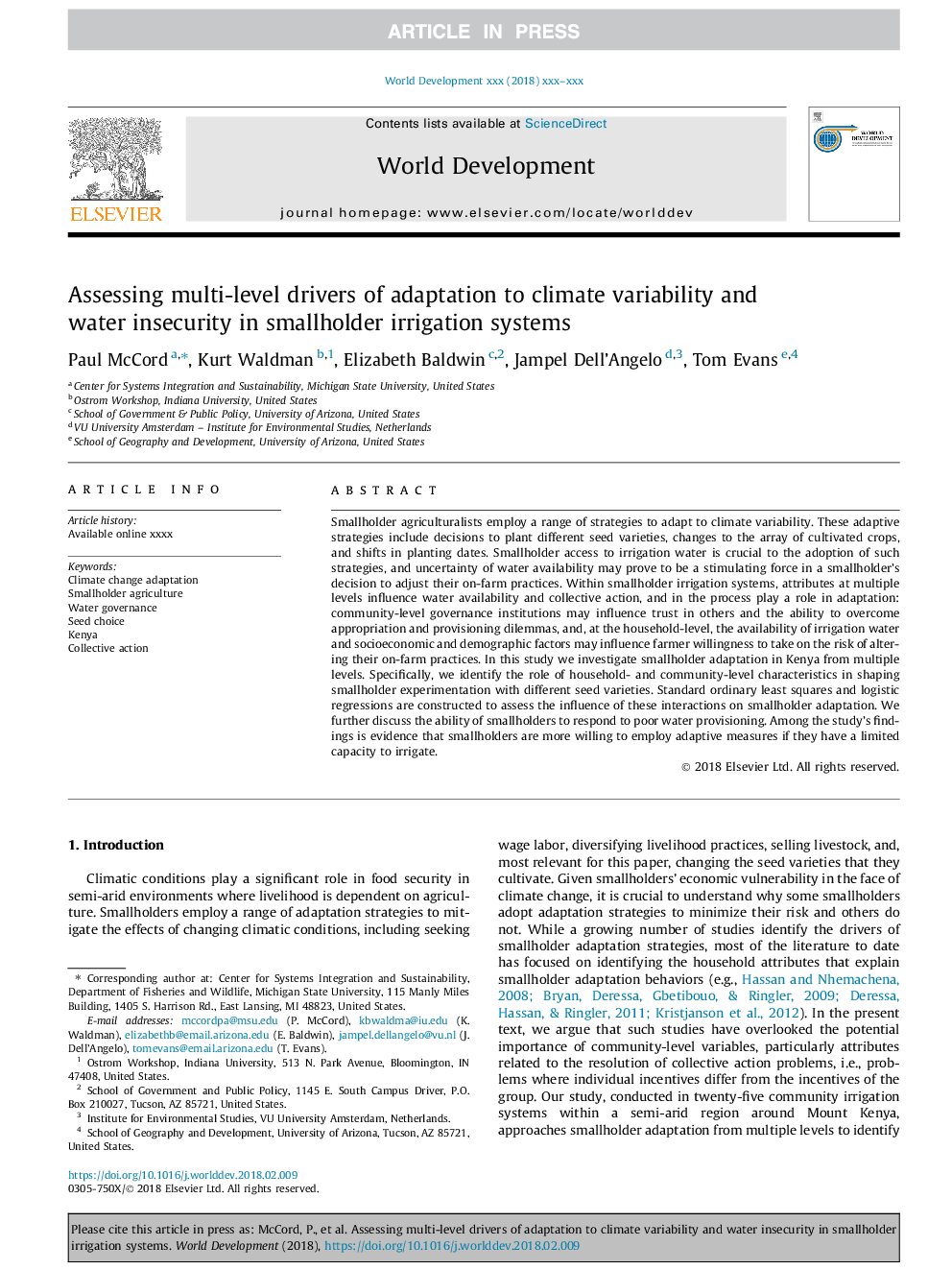| کد مقاله | کد نشریه | سال انتشار | مقاله انگلیسی | نسخه تمام متن |
|---|---|---|---|---|
| 7391616 | 1481110 | 2018 | 13 صفحه PDF | دانلود رایگان |
عنوان انگلیسی مقاله ISI
Assessing multi-level drivers of adaptation to climate variability and water insecurity in smallholder irrigation systems
ترجمه فارسی عنوان
ارزیابی رانندگان چند سطح سازگاری با تغییرات آب و هوایی و ناامنی آب در سیستم های آبیاری کوچک مالکان
دانلود مقاله + سفارش ترجمه
دانلود مقاله ISI انگلیسی
رایگان برای ایرانیان
کلمات کلیدی
سازگاری تغییرات اقلیمی، کشاورز کوچک حکومتداری آب، انتخاب بذر، کنیا، اقدام جمعی،
ترجمه چکیده
کشاورزان کم اهمیت، طیف وسیعی از استراتژی ها را برای انطباق با تغییرات آب و هوایی استفاده می کنند. این استراتژی های انطباق شامل تصمیم گیری برای کشت انواع مختلف بذر، تغییر در مجموعه ای از محصولات کشت شده و تغییر در تاریخ کاشت. دسترسی به افراد کم اهمیت به آب های آبیاری برای تصویب چنین استراتژیک ها بسیار مهم است و عدم اطمینان بودن در دسترس بودن آب ممکن است نیروی تحریک کننده در تصمیم کوچک مالکان برای تنظیم شیوه های مزرعه ای خود باشد. در سیستم های آبیاری کوچک مالکان، ویژگی های سطوح مختلف، بر قابلیت دسترسی آب و اقدام جمعی تاثیر می گذارند و در این فرایند در تطبیق نقش مهمی دارد: نهادهای حکومتی در سطح جامعه ممکن است بر اعتماد به دیگران و توانایی غلبه بر تخصیص و معضلات تأمین تأثیر بگذارند در سطح خانوار، در دسترس بودن آب آبیاری و عوامل اقتصادی- اجتماعی و جمعیتی ممکن است بر تمایل کشاورزان به ریسک تغییر رفتارهای مزرعه ای خود تأثیر بگذارد. در این مطالعه، سازگاری مالکان در کنیا از سطوح مختلف مورد بررسی قرار گرفته است. به طور خاص، نقش مشخصه های خانوار و اجتماع در شکل دهی آزمایش های کوچک مالکان با انواع مختلف بذر را شناسایی می کنیم. کمترین مربعات معمولی و رگرسیون لجستیک برای ارزیابی تأثیر این تعاملات بر سازگاری مالیان ساخته شده اند. ما بیشتر در مورد توانایی صاحبان دارایی های کوچک برای پاسخگویی به تهیه آب فقیر صحبت می کنیم. در میان یافته های این تحقیق شواهدی وجود دارد که صاحبان صاحبان سهام بیشتر مایل به استفاده از اقدامات سازگاری هستند اگر ظرفیت محدودی برای آبیاری داشته باشند.
موضوعات مرتبط
علوم انسانی و اجتماعی
اقتصاد، اقتصادسنجی و امور مالی
اقتصاد و اقتصادسنجی
چکیده انگلیسی
Smallholder agriculturalists employ a range of strategies to adapt to climate variability. These adaptive strategies include decisions to plant different seed varieties, changes to the array of cultivated crops, and shifts in planting dates. Smallholder access to irrigation water is crucial to the adoption of such strategies, and uncertainty of water availability may prove to be a stimulating force in a smallholder's decision to adjust their on-farm practices. Within smallholder irrigation systems, attributes at multiple levels influence water availability and collective action, and in the process play a role in adaptation: community-level governance institutions may influence trust in others and the ability to overcome appropriation and provisioning dilemmas, and, at the household-level, the availability of irrigation water and socioeconomic and demographic factors may influence farmer willingness to take on the risk of altering their on-farm practices. In this study we investigate smallholder adaptation in Kenya from multiple levels. Specifically, we identify the role of household- and community-level characteristics in shaping smallholder experimentation with different seed varieties. Standard ordinary least squares and logistic regressions are constructed to assess the influence of these interactions on smallholder adaptation. We further discuss the ability of smallholders to respond to poor water provisioning. Among the study's findings is evidence that smallholders are more willing to employ adaptive measures if they have a limited capacity to irrigate.
ناشر
Database: Elsevier - ScienceDirect (ساینس دایرکت)
Journal: World Development - Volume 108, August 2018, Pages 296-308
Journal: World Development - Volume 108, August 2018, Pages 296-308
نویسندگان
Paul McCord, Kurt Waldman, Elizabeth Baldwin, Jampel Dell'Angelo, Tom Evans,
